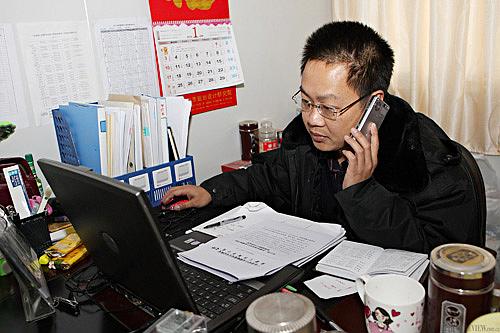|
 |
|
BUSY BEE: Li Xupeng, a volunteer from Zhuhai City, Guangdong Province, is busy at work in Mianchi, Wenchuan County, Sichuan Province, on January 23, 2010 (ZHAO XI) |
Li Xupeng had prepared himself for poor conditions when he went to Mianchi, a town in Sichuan Province's Wenchuan County that was hit hard during the devastating May 12, 2008 earthquake. But no preparations could prevent the fear that welled up within him as he felt the first aftershock rumbling beneath his feet.
Li, 41, was one of the first to come from Zhuhai City, Guangdong Province, to Mianchi to help residents rebuild their homes. He landed in Wenchuan on August 8, the opening day of the Beijing Olympic Games.
"I was watching the opening ceremony of the Olympics that night when a sudden jolt came and I started to taste the horror of a real earthquake," said Li. He joined his wife in the disaster zone, who was sent to work in Wenchuan not long after the earthquake.
Mianchi, a mountainous town with no more than 10,000 residents, was severely hit by the quake and suffered massive damage and casualties. Rebuilding the town has been in the hands of both locals and volunteers from Zhuhai who answered their call for help. The country initiated a rebuilding plan shortly after the quake—24 hard-hit counties in Sichuan, Shaanxi and Gansu provinces have been paired with a province or municipality that is giving it aid.
"I just wanted to contribute to the recovery of the people who suffered so much loss during the disaster. It is really an honor and a source of pride to me," said Li.
Li's living conditions are far from desirable. He had to stay with a local family in Mianchi for months before moving into the prefabricated house. The family's toilet was ruined during the quake so they were forced to use a pigpen as a temporary commode.
Li claims that he is the only one in his team who has managed to bathe daily, though that level of hygiene is difficult due to a water shortage after the earthquake. Sometimes he must use mountain creeks, rain or the dripping water from leaking pipes.
No time for boredom
During the first two or three months, Li and his colleagues mapped out all the villages in Mianchi on foot to investigate and collect information for reconstruction. It was not an easy task as many of the villages were scattered along mountainsides or on top of them. "We had to walk a dozen kilometers every day," said Li.
He said he was not accustomed to the amount of work that needed to be done in the quake area.
"Being a small official in Zhuhai Bureau of Science and Technology needs me to manage a dozen of people. But here our 30-person-or-so team has to take charge of rebuilding for several thousand local people," Li said, adding that the work could span seven days a week, day and night to get it done as quickly as possible.
During their initial investigation, Li and his colleagues often felt exhausted after their long walks in the mountains that were accompanied by frequent and frightening aftershocks. "We were just too tired to feel scared," he said.
Though the members of the Zhuhai team have managed to adjust to the local environment, they have faced problems with their diet, medical staff said. Doctors found that the team members are not absorbing calcium in Mianchi as well as they do at home and osteoporosis has set upon some of them. Two have suffered broken legs and others have complained about sore joints.
Adding more to the discomfort for the city dwellers, the remote mountainous area offers little in the way of entertainment—no shopping centers, big restaurants, bars or movie theaters. Their only entertainment comes from TV and the Internet and the TV signal is constantly unstable in this area.
"When there comes leisure time after work, we have nothing to do so we might as well keep on working to kill time," Li said.
But they have found various ways to kill the boredom. They have taken up digital cameras and camcorders and documented every aspect of their life and work. They have called themselves the Haimian Crew, which means "sponge crew" and combines the Chinese words for Zhuhai and Mianchi. They also produce plays and dance performances to take part in the countywide parties to boost morale in Wenchuan.
But sometimes nothing can stop the loneliness attendant to this type of selfless work.
"I miss my wife and my 11-year-old son. I'm glad that both of them understand and support what I'm doing here," said Li, who has only been home twice since he came to work in Mianchi.
The optimistic and uncompromising spirit of locals touched Li when he arrived and has not since abated. "First we were moved by their spirit. Then we began to feel pressure on our shoulders. If we don't do our work well, we would feel truly guilty," he said. | 